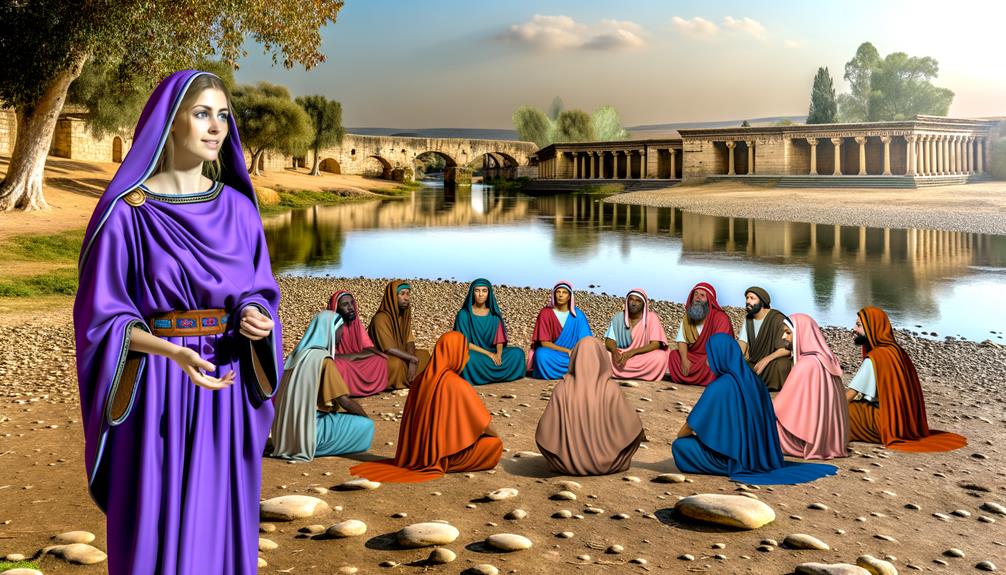Lydia in the Bible Meaning: Woman of Faith
Lydia, a significant figure in the New Covenant, represents the intersection of commerce, faith, and early Christian communal life.
Originating from Thyatira, a city renowned for its trade in purple dye, Lydia’s role as a ‘seller of purple‘ underscores her affluence and economic influence.
Her conversion by Apostle Paul, alongside her hospitality in Philippi, highlights the spread of Christianity among Gentiles and showcases the essential contributions of women in the early Church.
Lydia’s story intertwines wealth, spirituality, and social transformation in early Christian contexts, offering profound insights into the role of women in religious and social spheres.

Lydia in the Bible: Meaning, Story, and Spiritual Significance
| Aspect | Details |
|---|---|
| Name | Lydia |
| Meaning | From Lydia (a region in Asia Minor); may mean “kind” or “noble one” |
| Biblical Role | First documented European convert to Christianity |
| Occupation | Seller of purple cloth (a symbol of wealth and status) |
| Key Scripture | Acts 16:14-15 |
| Spiritual Significance | Represents hospitality, faith, and support for early Christian missions |
| Legacy | Opened her home for worship; an example of faithful, generous service |
Lydia’s Background

Lydia’s background is intricately tied to the ancient city of Thyatira, a well-known center for trade and commerce, particularly famous for its production of purple dye. This vibrant city in the region of Lydia, modern-day Turkey, was a hub for artisans and merchants.
Purple dye, derived from the murex shellfish or certain plants, was a luxury item symbolizing wealth and status.
Lydia, described as a ‘seller of purple,’ indicates her likely affluent status and significant role in this lucrative industry. Historically, Thyatira’s prominence in trade underscores Lydia’s possible connections and influence.
Theologically, her occupation suggests a woman of independence and means, which set the stage for her notable encounter with early Christian missionaries, reflecting a divinely orchestrated intersection of commerce and faith.
Meeting Paul

During one of Paul’s missionary journeys, he encountered Lydia at a place of prayer by the river outside the city of Philippi. This location was significant, as it was a customary gathering spot for God-fearing women in a largely pagan region.
Lydia, a merchant of purple cloth, represents the intersection of commerce and faith. The encounter highlights the spread of early Christianity beyond traditional Jewish boundaries, reaching influential and diverse individuals.
| Aspect | Detail |
|---|---|
| Location | River outside Philippi |
| Lydia’s Profession | Merchant of purple cloth |
| Cultural Context | Largely pagan region |
| Significance | Spread of Christianity to diverse individuals |
This meeting underscores the inclusive nature of Paul’s mission and the strategic importance of Lydia’s social and economic standing.
Conversion to Christianity

The conversion of Lydia, as recorded in Acts 16:14-15, holds considerable theological significance, particularly through her baptism, which underscores the early church’s practice of household conversions.
Paul’s evangelistic efforts played a vital role in this transformative moment, illustrating the apostolic mission‘s reach and impact in Europe.
In addition, Lydia’s subsequent contributions to the nascent Christian community highlight her pivotal role in the spread and establishment of early Christianity.
Lydia’s Baptism Significance
How does the baptism of Lydia mark a pivotal moment in the spread of early Christianity and highlight the inclusive nature of the Christian message?
Lydia’s baptism, as recounted in Acts 16:14-15, signifies a significant expansion of the Christian faith into Europe. Her conversion and subsequent baptism underscore the breaking of cultural and social barriers, with Lydia being a wealthy, independent woman from Thyatira.
This event not only illustrates the universality of the Christian call but also emphasizes the egalitarian nature of the early Christian community, where societal status and gender held no bearing on one’s acceptance.
Lydia’s hospitality post-baptism further strengthens this narrative, showcasing the transformative impact of faith and the growing network of early Christian believers.
Role of Apostle Paul
Building on the significance of Lydia’s baptism, the role of Apostle Paul in the spread of Christianity becomes evident through his transformative conversion and tireless missionary work.
Paul’s encounter with Christ on the road to Damascus marked a pivotal moment in Christian history, shifting from a persecutor of Christians to a devout apostle.
His missions, particularly to Gentile communities, catalyzed the expansion of the early church and provided theological foundation through his epistles.
| Event | Significance | Impact |
|---|---|---|
| Conversion | Encounter with Christ | Fundamental shift in beliefs |
| Missionary Journeys | Spread Christianity to Gentiles | Expansion of early church |
| Epistles | Theological and doctrinal teachings | Foundation for Christian doctrine |
Paul’s role was essential in establishing Christianity’s reach and doctrinal coherence.
Early Church Contributions
Amidst the burgeoning spread of Christianity, early church contributions such as Lydia’s conversion played an essential role in establishing a diverse and inclusive faith community. Lydia’s acceptance of the Christian faith, as recorded in Acts 16, marks a pivotal moment in the early church, highlighting several key aspects:
- Cultural Diversity: Lydia, a Gentile and successful businesswoman, signifies the breaking of ethnic and social barriers.
- Hospitality and Support: Her home became a meeting place for believers, fostering communal worship and fellowship.
- Economic Influence: As a seller of purple cloth, Lydia’s resources likely provided financial support for missionary activities.
These contributions collectively underscore the dynamic nature of early Christian communities.
Role in Early Church

Lydia’s conversion to Christianity marked a pivotal moment in the spread of the early church, underscoring the importance of female leadership in a largely patriarchal society.
Her act of opening her home to Paul and his companions not only provided immediate physical sustenance but also established a vital base for the nascent Christian community in Philippi.
This hospitality signifies the role of personal resources in the propagation of the faith and highlights the theological principle of communal support within the early church.
Lydia’s Conversion Significance
The conversion of Lydia, a prominent businesswoman in Philippi, holds significant theological and historical implications for the early Christian Church.
It exemplifies the expanding reach of Christianity beyond traditional Jewish boundaries and highlights the essential role of women in the nascent Christian community.
Lydia’s baptism by Paul is notable for several reasons:
- Cultural Integration: Demonstrates the gospel’s acceptance across diverse ethnic and socio-economic groups.
- Female Leadership: Marks the active participation and leadership roles of women in early Christian ministry.
- Economic Influence: Reflects the influence of economically empowered individuals in spreading Christianity.
Lydia’s conversion therefore symbolizes a pivotal moment in the church’s mission.
Hospitality to Apostles
Hospitality in the early Christian Church was not merely a cultural expectation but an essential expression of fellowship and support, as evidenced by Lydia’s generous reception of Paul and his companions in Philippi.
Her open home became a sanctuary for the apostles, facilitating the spread of the Gospel. Historically, hospitality was crucial for itinerant preachers who relied on the goodwill of believers.
Theologically, Lydia’s actions underscored the Christian virtue of hospitality, reflecting Jesus’ teachings on welcoming strangers (Matthew 25:35).
Lydia’s home likely served as a nucleus for the burgeoning Philippian church, embodying the communal spirit that was critical for early Christian communities.
Her role underlines the importance of lay contributions to the propagation of faith.
Lydia’s Business Ventures

Renowned for her role as a successful merchant dealing in purple cloth, Lydia’s business ventures exemplify the economic opportunities and social dynamics of women in the early Christian era. Operating in Philippi, a prominent Roman colony, Lydia’s trade in luxury textiles underscores her significant social and economic status.
Her entrepreneurial success reveals several key aspects:
- Economic independence: Lydia’s business afforded her financial autonomy, a notable achievement for a woman of her time.
- Influence and networking: Her trade connections likely extended across various regions, enhancing her influence.
- Role in early Christian community: Her wealth facilitated her generous hospitality towards Paul and other apostles.
This analysis highlights Lydia’s impactful presence in early Christianity.
Symbolism of Purple Cloth

In the biblical context, purple cloth is imbued with significant symbolism, representing royalty and nobility due to its rarity and the intricate process of its production in ancient times.
This luxurious fabric also connoted wealth and prosperity, as it was often accessible only to the elite and affluent.
Theologically, purple’s rich hue came to symbolize spiritual depth and divine authority, enhancing Lydia’s role as a pivotal figure in early Christian narratives.
Royalty and Nobility
Throughout ancient history, purple cloth has been emblematic of royalty and nobility, symbolizing wealth, power, and high social status.
The dye, derived from the murex snail, was exceptionally rare and costly, making purple garments a luxury reserved for the elite.
This exclusivity is reflected in various historical and scriptural contexts, where purple attire denotes:
- Imperial Authority: Roman emperors and officials often donned purple robes.
- Religious Significance: High priests in ancient Israel wore purple as a symbol of divine favor.
- Economic Status: Merchants dealing in purple cloth, like Lydia, were considered affluent.
Theologically, purple’s rarity and value underscore its connection to divine ordinances and sovereign rule.
Wealth and Prosperity
The unparalleled value of purple cloth in ancient times not only signified royalty and nobility but also epitomized wealth and prosperity. It served as a visual representation of the economic stature of its wearer.
Derived from the rare Murex snail, purple dye production was labor-intensive and costly, making the fabric a luxury item. Lydia, a seller of purple cloth in the Bible, consequently operated within a lucrative trade, indicating her substantial financial success.
Historically, the exalted status of purple garments underscored social hierarchies, with only the affluent affording such luxury.
Theologically, Lydia’s association with purple cloth highlights her role as a prosperous and influential figure in her community, emphasizing the intersection of faith and economic well-being in Biblical narratives.
Spiritual Significance
Although primarily associated with wealth, the purple cloth that Lydia sold also bore significant spiritual symbolism in the Bible, reflecting themes of divine authority, sanctity, and the priesthood.
Historically, purple dye was exceedingly rare and costly, reserved for royalty and the elite. This exclusivity extended to religious contexts, where purple garments adorned high priests and temple furnishings.
Theologically, purple signifies:
- Divine Authority: Representing God’s sovereignty and kingship.
- Sanctity: Symbolizing purity and holiness.
- Priesthood: Emphasizing the sacred duties and responsibilities of religious leaders.
Lydia’s trade in purple cloth consequently situates her within a broader biblical narrative, intertwining commerce with profound spiritual dimensions.
Hospitality to Paul

Lydia’s hospitality to Paul and his companions, as recorded in Acts 16:15, serves as a profound demonstration of her faith and generosity, reflecting the early Christian values of community and support for missionary work.
Her invitation to stay at her home (‘If you have judged me to be faithful to the Lord, come to my house and stay’) showcases her willingness to use her resources for the benefit of the nascent Christian mission.
This act is significant in a historical context where hospitality was a crucial social and religious duty, further emphasizing her commitment.
Theologically, Lydia’s actions embody the principles of Christian charity and fellowship, illustrating the practical outworking of faith through tangible support for God’s messengers.
Impact on Philippi

By extending her hospitality to Paul and his companions, Lydia not only demonstrated her faith but also played a vital role in establishing the early Christian community in Philippi. Her actions provided a fundamental foundation for the spread of Christianity in the region.
Lydia’s home became a central meeting place for believers, fostering spiritual growth and communal support.
This influence is highlighted through:
- Hosting gatherings: Her home served as the first church in Philippi.
- Economic support: Her resources helped sustain Paul’s mission.
- Conversion catalyst: Her example encouraged others to convert.
Thus, Lydia’s contributions were instrumental in shaping the early Christian landscape in Philippi, marking her as a significant historical and theological figure.
Contributions to Christianity

Renowned for her crucial role in the early Christian church, Lydia’s contributions extend beyond her hospitality, reflecting a deep socioeconomic and theological impact that resonates throughout Christian history.
A successful merchant in purple cloth, Lydia represents an intersection of wealth, influence, and faith.
Her conversion and subsequent baptism by Paul not only marked a significant expansion of Christianity into Europe but also highlighted the faith’s reach across social strata.
Lydia’s home became the first Christian church in Philippi, demonstrating her commitment and providing a foundation for communal worship and evangelism.
Her story underscores the early church’s inclusivity and the essential role of laypersons in spreading the Christian message, consequently shaping the church’s growth and structure.
Representation of Women

Despite the patriarchal context of the ancient world, Lydia’s prominence in the biblical narrative challenges traditional gender roles and offers a profound example of female leadership within the early Christian community.
Her representation signifies a pivotal shift in how women could influence religious movements.
Lydia’s story highlights:
- Economic independence: As a merchant of purple cloth, she demonstrated financial autonomy.
- Spiritual agency: Her decision to convert and host Paul and his companions underscores her active spiritual role.
- Community leadership: By opening her home, she created a space for early Christian gatherings.
Lydia’s narrative consequently serves as a witness to the impactful roles women played in early Christianity.
Lydia’s Legacy

Lydia’s legacy extends beyond her immediate contributions, offering a lasting demonstration of the enduring impact of female leadership and faith in the nascent Christian church.
Historically, Lydia’s conversion and subsequent support of Paul’s mission in Philippi underscore the pivotal role women played in early Christian communities. Her home became a meeting place for believers, symbolizing hospitality and spiritual fortitude.
Theologically, Lydia exemplifies the breaking of socio-religious barriers, being both a Gentile and a woman of affluence, yet fully embraced by the Christian faith.
Her story invites reflection on the inclusive nature of Christianity and the potential for women’s leadership in religious contexts.
Lydia’s legacy, thus, is a demonstration of the transformative power of faith and community.
Conclusion
Lydia’s narrative intricately weaves together historical context, theological significance, and socio-economic dimensions.
As a businesswoman and early convert, Lydia played a pivotal role in the nascent Christian community in Philippi. Her conversion under Paul’s ministry and subsequent contributions underscore the inclusive nature of the early Christian message.
Moreover, Lydia’s prominence exemplifies the essential role women played, often serving as the backbone of early church society.
Her legacy, consequently, stands as a demonstration of faith’s transformative power, proving that actions speak louder than words.






